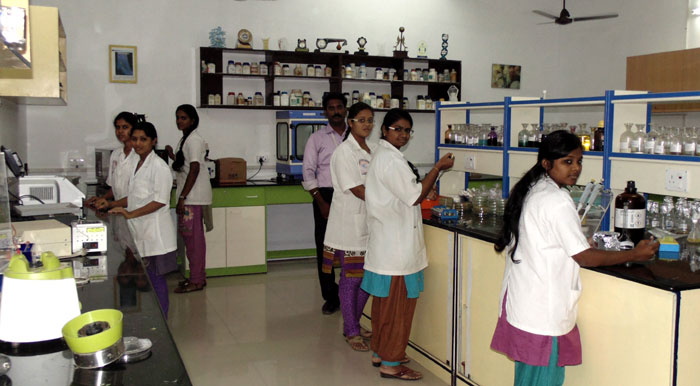
 B.Tech. Food Processing Technology
B.Tech. Food Processing Technology
Sanctioned Strength: 30
Duration: 4 Years (8 semesters)
Eligibility: Should have passed 10+2 with Physics, Chemistry, Maths or Biology with minimum 50% marks in aggregate.
Mode of Selection: Entrance Examination / Personal Interview
Lateral Entry
Lateral Entry: The candidate should undergo, 3 years Diploma or Degree Programme in the following disciplines.
Any one of the 2/3 years Diploma Programme like Food Technology / Dairy Technology / Fisheries Technology / Mechanical / Chemical / Catering
Any one of the 3 years B.Sc Degree Programme in Food Science / Food and Nutrition / Dietetics / Home Science / Microbiology / Biochemistry / Biotechnology / Chemistry / Physics / Food Management and Service / Catering.
Career Opportunities
Food Inspector
Process Development Specialists
Toxicologist
Manufacturing Specialist
Food Processor
Food Production Manager
Sales Marketing Brand Management
Dietician, Nutritionist
Product Development Specialists
Placement Opportunities
Processing of Agri – goods, Dairy, Seafood processing and packaging, Beverages (alcoholic and soft drinks), Poultry, Confectionary, Food packaging industry, Biopharma companies.
Research and Development:
Food Scientist, Food Technologist, Food Chemist, Product Development Specialist, Food Formulation Scientists.
Programme Educational Objectives (PEO)
PEO1: Be efficient Food analysts with quality knowledge and essential skills as per the industry needs.
PEO2: To provide the strong foundation in the areas of food engineering, post-harvest practices and value addition of food materials.
PEO3: Graduates of the program must be able to competently work with professionals of related fields over the wide spectrum of practice in areas of processing and food engineering, post-harvest technology and value addition.
Program Outcomes (PO)
PO1: Apply the knowledge of mathematics, science, engineering fundamentals and an engineering specialization to the solution of complex technical problems.
PO2: Identify, formulate, review research literature, and analyze complex engineering problems reaching substantiated conclusion using first principles of mathematics, natural science and engineering science.
PO3: Design solutions for complex engineering problems and design system components or processes that meet the specified needs with appropriate consideration for public health and safety, and the cultural, societal and environmental considerations.
PO4: Use research –based knowledge and research methods including design of experiments, analysis and interpretation of data, and synthesis of the information to provide valid conclusion.
PO5: Create, select, and apply appropriate techniques, resources and modern engineering and IT tools including prediction and modeling to complex engineering activates with an understanding of the limitations.
PO6: Apply reasoning informed by the contextual knowledge to asses societal and environmental contexts, and demonstrate the knowledge of and need for sustainable development.
PO7: Understand the impact of the professional ethics and responsibilities and norms of the engineering practice.
PO8: Apply ethical principles and commit to professional ethics and responsibilities and norms of the engineering practices.
PO9: Function effectively as an individual, and a member or leader in diverse teams, and in multidisciplinary setting.
PO10: Communicate effectively on complex engineering activities with the engineering community and with society at large, such as being able to comprehend and write reports effectively and design documentation, make effective presentations and give and received clear instructions.
PO11: Demonstrate knowledge and understanding of the engineering and management principles and apply these to one’s own work, as a member and leader in a team, to manage projects and in multidisciplinary environments.
PO12: Recognize the need for, and have the preparation and ability to engage in independent and life-long learning in the broadest context of technological change.
Programme Specific Objectives (PSOs)
PSO1: Apply the knowledge of Food Technology, investigate and solve the complex in food processing and nutrition to meet the specified needs with appropriate considerations for the society.
PSO2: Develop solutions for complex Engineering problems in the broad field of Food Engineering.
PSO3: Analyze, design and integrate knowledge of Food processing techniques in food industries and create passion for life-long learning and research in advanced fields.